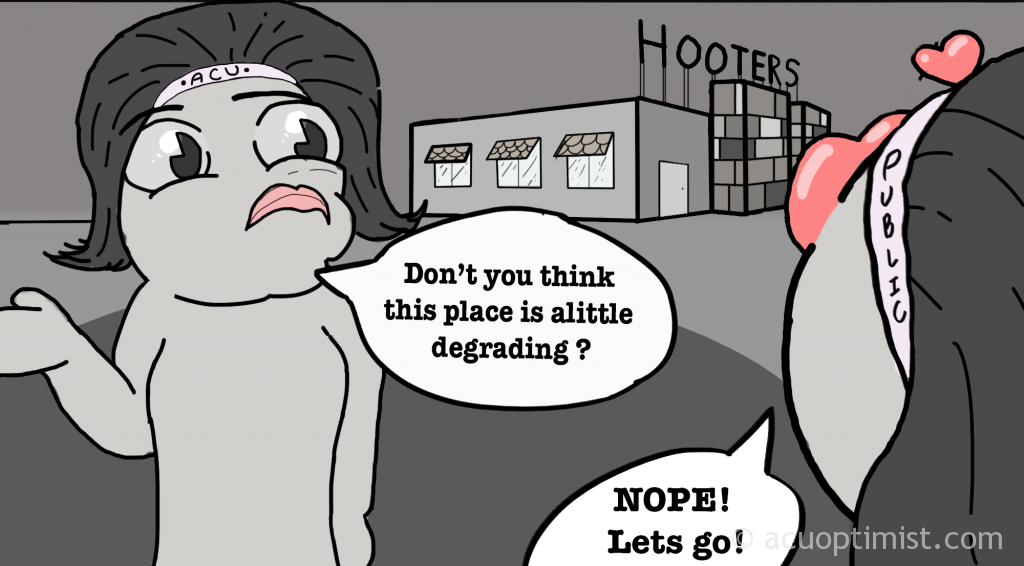Before finals week last semester, in preparation of Hooters opening just off I-20, we reached out to the Office of Student Life to see what position the university would take about students working at the business. Dr. Chris Riley, vice president for Student Life, cautioned students against working at Hooters, citing court cases and the student handbook to question how the business views women. Local television station KTXS picked up the story and before we knew it, it was nationwide on sites like Fox News and Breitbart. Even Total Frat Move had some thoughts on the matter, calling the university position “anti-women/anti-freedom.”
Our editorial board was split on the matter. Some of us think the university has a right to make such a statement while some of us think the university shouldn’t tell us where we should work.
Here’s our thoughts:
Editorial #1 Agreeing with ACU’s statement
Let’s be honest, the university isn’t really going to punish students for working at Hooters, just like they don’t always punish students for breaking the sexual stewardship part of the Student Handbook in other ways. They know students are having premarital sex, but the rule has been inconsistently enforced.
The university’s statement doesn’t even say they will punish students for working at or going to Hooters. It just says according to the handbook, they have the right to tell you not to work at Hooters because you signed an agreement to follow that handbook. Every student lays down some rights when they come to this university because they agree to follow the university’s code.
Some have said ACU shouldn’t parent us by telling us where we can’t work. While it’s true we are adults with the freedom to make our own decisions, being an adult also means accepting the restrictions in our chosen place of work or study. Are you going to quit your job when your boss asks you to only drink water in the office (like Amazon does)? Are you going to get mad at your future homeowners’ association for restricting your right to paint your fence blue?
ACU has come a long way since the time when our professors were students– a time when the university prohibited students who were of legal drinking age from going to bars. Our sister schools have some tight restrictions to this day. At Harding University, students aren’t allowed to go to dance clubs, and at Oklahoma Christian University, “inappropriate” hairstyles are banned. Even ACU has a dress code that prohibits halter tops and midriffs, but we’ve all seen some of those on campus which goes to show that just because a rule is in the handbook, doesn’t mean the university is actually going to punish you for breaking it.
Legally, private schools can control your actions both on and off campus much more than a state school does. If you don’t like the restrictions, transfer to another school.
Editorial #2 Disagreeing with ACU’s statement
While private schools do have the right to restrict or prohibit certain actions, the university must realize that Hooters is simply a restaurant, not a gentleman’s club. Many people may believe that Hooters is just a company which stands to objectify the female body and capitalize off of it, but this is simply false.
People must realize that Hooters works to improve communities around the country. Hooters is partnered with the Jimmy V Foundation for Cancer Research, has an endowment fund that supports the Make-A-Wish Foundation and has established a Breast Cancer Research Grant in the name of Kelly Jo Dowd, famous Hooter Girl. The restaurant chain stands for great causes –causes that the university also stands behind.
ACU remains one of the most expensive colleges in the state, and while the university does its best to provide financial aid, most students will still owe thousands of dollars. ACU should not tell students where they can and cannot go. Employment is employment, and unless they are willing to lower the prices on tuition, I bet we’ll be seeing a couple of Wildcats serving us some chicken. In the words of Micheal Scott, “I’ll have the chicken breast, hold the chicken.” Yes, ACU, that was a joke.
We are living in a time where women are expressing themselves the way they want to and not the way society wants them to. The concept of “It’s my body, and I’ll do what I want with it” runs freely within our culture. Yes, Hooters allows for women to show their midriff, but does that make them items of sin? The women working at Hooters are proud, confident, love their bodies and therefore, are choosing to work there. Hooters is not a bad place – nor is it a strip club. It’s a restaurant that chooses to use women’s bodies as an incentive to enter into their business. And that’s the point.
ACU and most of the Abilene community needs to understand the difference between what a restaurant stands for and what a restaurant could mean. In other words, is Hooters a sinful place? Absolutely not, unless you consider wings and breasts sinful. Is Hooters any different than the checkout girl at Target wearing a tighter shirt exposing the outline of her figure? No. The point is, ACU is fixated on the idea that Hooters influences our thoughts about sex, and of course, if you’re not married, sex is bad.

